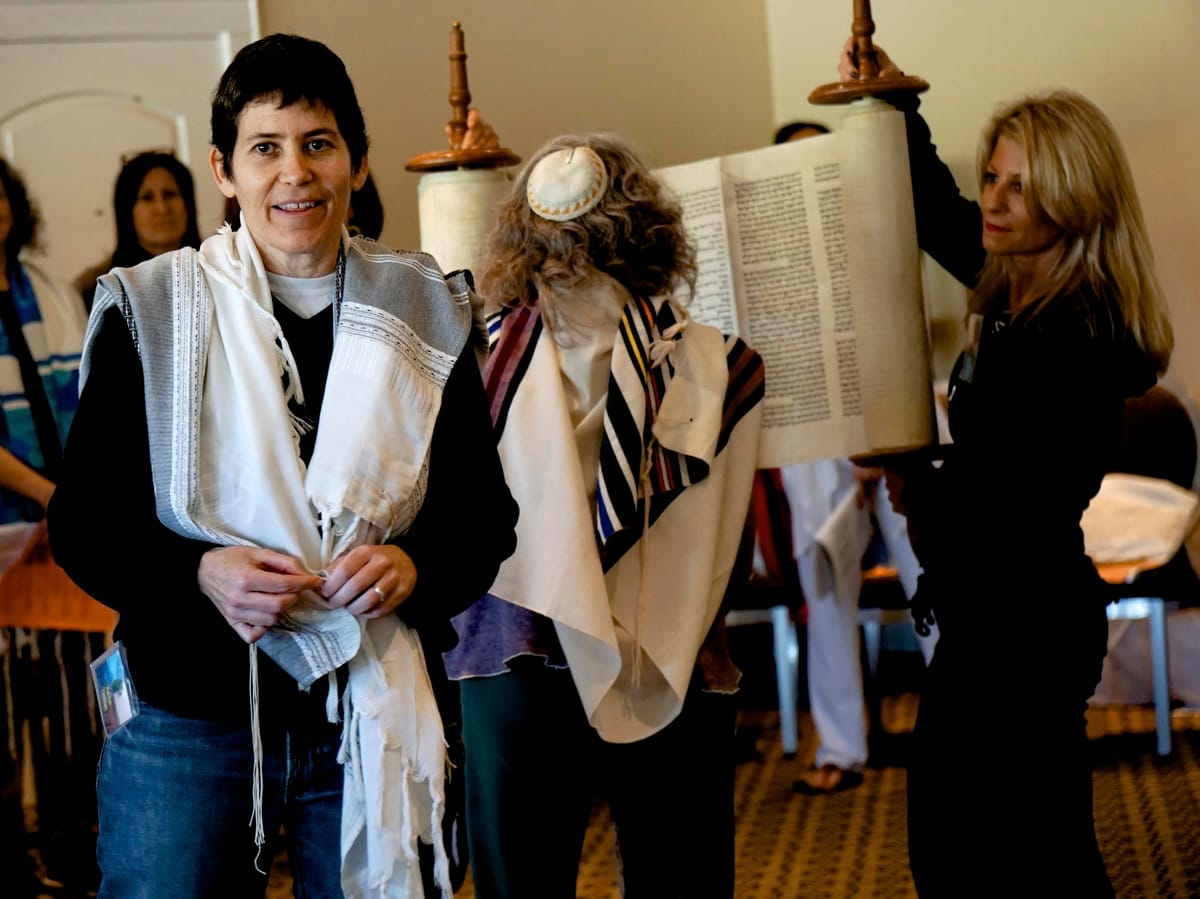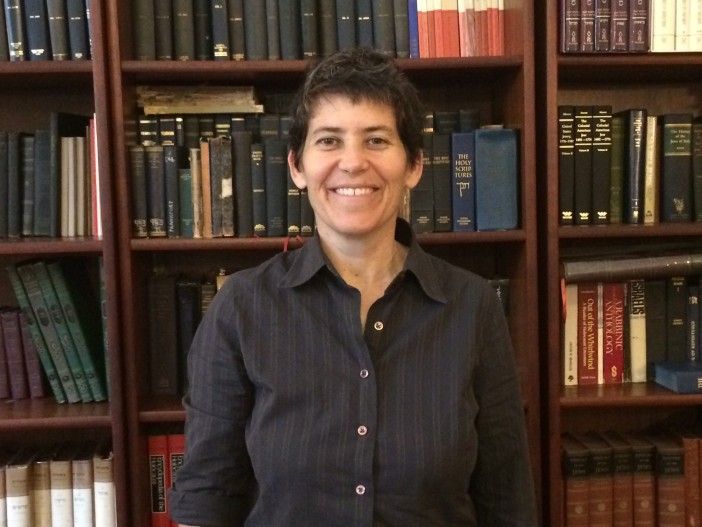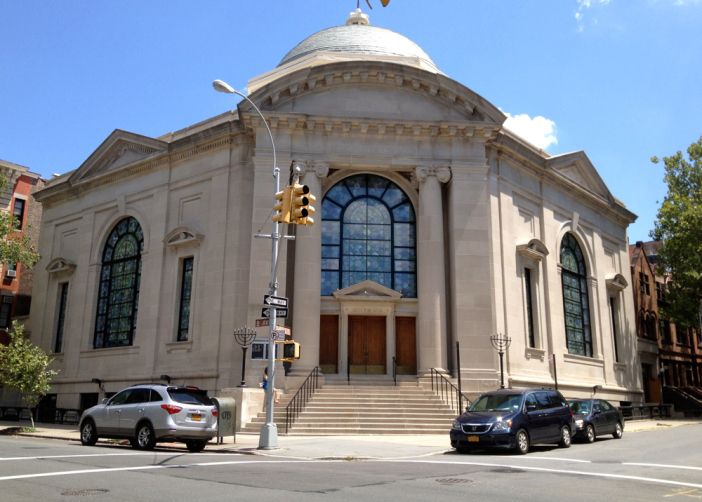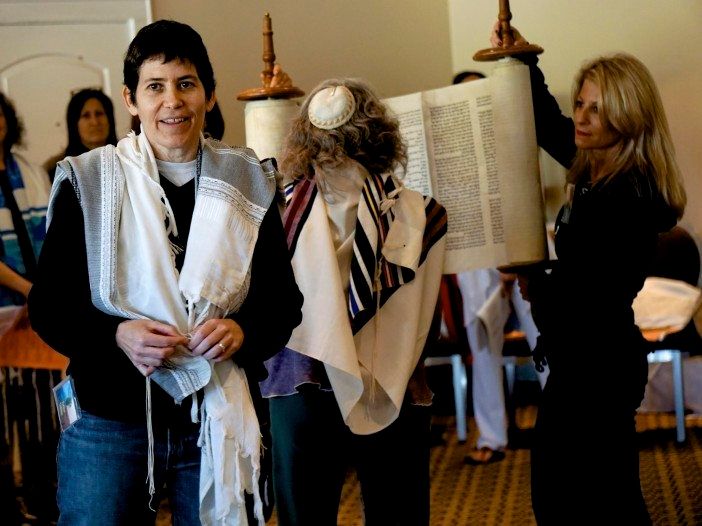Spirituality, Activism & Community: Rabbi Rachel Timoner Joins Congregation Beth Elohim


Rabbi Rachel Timoner is sitting comfortably in her study at Congregation Beth Elohim (CBE). Although she became Senior Rabbi at CBE and relocated to Brooklyn only a few weeks ago, there is a sense of ease and aplomb in her demeanor. She joins CBE after having been Associate Rabbi at Leo Baeck Temple in Los Angeles from 2009 to 2015. Her family and personal items will arrive in mid-August, however it is clear she is already settling in — to both CBE and to the Park Slope community.
Rabbi Timoner is a native of Miami, Florida and attended Yale University as an undergraduate. She was ordained at Hebrew Union College-Jewish Institute of Religion (HUC-JIR) in Los Angeles and has received awards for both her scholarship and leadership, including the Lorraine Helman Rubin Memorial Prize for Scholarly Writing and the Women of Reform Judaism Centennial Prize.
Rabbi Timoner’s activity expands beyond the traditional role as rabbi within a congregation. Her community activism plays a vital role in her work, and her investment in causes of social justice has made her a significant leader in the United States Jewish community.
Cantor Joshua Breitzer of CBE will closely collaborate with Rabbi Timoner. As a cantor, Breitzer leads prayer services alongside the rabbi and is also musical director. When asked about Rabbi Timoner, Breitzer remarked that she brings “an extremely sharp intellect and profound thoughtfulness to our community.”
Breitzer and Timoner share a significant amount of philosophical intersections.
“When I first met the rabbi, she felt very familiar. Part of that is because we were ordained from HUC-JIR within a few years of each other,” says Breitzer. “We have many classmates in common, many of the same teachers…so there was a notion of partnership from the very get-go. I recall one of the first things she said to me: ‘I can’t wait to partner with you.’”
The board leadership expresses a similar enthusiasm to that of CBE’s clergy. President Jonathan Fried speaks of Rabbi Timoner as “an inspiring teacher and has a tremendous ability to connect with people on a pastoral level.” When asked about the search process and choice for a new rabbi, Fried described the meetings as “a mutual ‘falling in love process’ between the rabbi and our congregation.”
Fried also attended services led by Rabbi Timoner in Los Angeles.
“Watching her in front of the room, it seemed as though each congregant felt that she was talking to them personally,” he says.
We had the opportunity to meet with Rabbi Timoner to discuss her new leadership role at CBE, her thoughts on activism, spirituality, and her new neighborhood haunts.

PSS: What is it about CBE that brought you to Park Slope to lead the congregation?
Rabbi Rachel Timoner: I think that CBE is one of the most exciting congregations, not just here in New York, but in American Jewish life. The vitality and creativity here are thrilling. This is a Reform congregation where kids and adults come together every Shabbat to learn and celebrate at the same time, where a great diversity of Jewish expression happens under one roof, and where Jewish living and learning expands far beyond the walls of the synagogue into homes, public spaces, and outdoor places. I also love that CBE connects the arts, literature, and informal education to Judaism and the larger community. I love our Brooklyn By The Book program, as just one example.
I am always looking for opportunities to surprise people about what Judaism is and what takes place inside the synagogue. Some people think they know what synagogue is — and think it is boring. But Judaism is about the most essential questions of what it means to be alive, and when done right it is profound, stimulating, and irresistible.
You are known not only as a rabbi, but a community organizer and activist. What are some projects that you are looking to focus on with CBE?
CBE has a long history of engaging in social action. Among other things, we were on the forefront of providing assistance after Hurricane Sandy through CBE Feeds, we provide a homeless shelter, and since Sandy Hook we worked to address issues of gun violence. I want to take our social justice work to the next level, by creating a full spectrum of opportunities for people to be involved in social change, from one-time acts of kindness to long-term community organizing that repairs the root causes of injustice in our city and country. I want to engage our congregation in a conversation that addresses what is breaking our hearts and how we can be part of healing our society. I want to partner with the broader community to become a powerful force for social transformation.
In addition to activism, you are also a spiritual leader. You’ve written extensively on the subject. What is the relationship between activism and spirituality?
The relationship between social justice and spirituality is perhaps the central question in my life. When we look out at the world and see suffering, it’s easy to become overwhelmed or to despair. A spiritual practice, like prayer, meditation, or study, enables us to replenish ourselves and remember how much we have to be grateful for. A combination of spirituality and social justice allows us to ground ourselves in a set of traditions and practices that sustain us and enable us to take strategic action based in hope.
Spirituality is the antidote to despair. Social action is the antidote to isolation and complacency. Together, they invite us to look inward and outward — and to commit ourselves to participate in the healing of the world.

How do you see you and CBE reaching out to the non-Jewish community?
An important role for any synagogue community is to partner with others across lines of faith, race, and neighborhood to learn from one another and build relationships so that we can improve our neighborhoods and cities. I am looking forward to getting to know other clergy as well as civic and community leaders. I want to engage with thinkers and leaders in politics, the arts, business, science, and all different walks of life. I would like to create a lecture and dialogue series about the intersection between these fields — especially where art and science meet religion.
Judaism concerns every aspect of human life. There is relevance and meaning in us making connections. I envision a conversation that brings together Jews and non-Jews in contemplation about what makes us human, and what is the best we can do with our brief lives.
Brooklyn has an immense variety of Jewish communities. The Hasidic and Orthodox communities are significant here. How does a Reform congregation relate to them?
I am very much looking forward to getting to know rabbis in the Brooklyn Orthodox community. CBE has a beautiful spectrum of Jewish expression within our own community, which will enable us to have dialogue here about the different ways of being Jewish and living a Jewish life. It’s good for us to open our minds to practices we’ve never tried or that aren’t our own. I find some of the Orthodox traditions to be beautiful. And some Orthodox practices are not for me.
We all need a big dose of curiosity to consider that there may be wisdom in others as we look at a variety of Jewish expression. We are, after all, klal Yisrael, one Jewish community who are connected to and responsible for one another.
You moved here in early July, so you’re just getting settled. How are you adjusting?
My family isn’t here yet. They’ll be arriving in mid-August, and I’m really looking forward to that. In the few weeks I’ve been here, I can tell you that I love being able to walk everywhere. I love exploring Prospect Park, the Brooklyn Public Library — all the nooks and crannies. When I walk down the street, people come up to introduce themselves and ask if I’m the new rabbi. The community has already been so warm, welcoming, and kind. I feel like the neighborhood is very cohesive. It’s similar to being in an extended congregation, a congregation with no walls. So far I’m having fun.
We’d enjoy hearing a bit about your family. When they arrive, what activities and interests do you think they’ll enjoy in the community?
I have two sons — Benji is 13 and Eitan is 10. Benji loves to play lacrosse, ultimate frisbee, and baseball. He’s going to be spending a lot of time in Prospect Park. Eitan has already gotten very familiar with the Brooklyn Game Lab. In his imagination, he will be there every day.
[pullquote]”An important role for any synagogue community is to partner with others across lines of faith, race, and neighborhood to learn from one another and build relationships so that we can improve our neighborhoods and cities.”
–Rabbi Rachel Timoner[/pullquote] My wife Felicia is going to absolutely love living here. She is not going to take a job at first, but instead is going take some time to help everyone to get settled. She has been very busy in the past. She served as executive director at Congregation Beth Chayim Chadashim in Los Angeles and then worked with County Supervisor Sheila Kuehl in Los Angeles, most recently passing a new minimum wage for Los Angeles County. She hopes to take her time to get to know this community in order to get involved.
And we also have two dogs, so living by the park is going to be great. We’ll be living close to CBE, so I’ll be able to take a 10-minute walk to go home for dinner and be with my family. That’s very important to me.
Are there any local spots that you’ve discovered, any places that you think will become local haunts?
I loved visiting the Botanic Gardens. I’ve already special ordered a book at Community Bookstore! I find that sitting on the grass in Prospect Park makes me happy. And I’m really looking forward to discovering Celebrate Brooklyn. I want to connect to the incredible arts offerings and go to the theater.
Connecting art to Jewish life at CBE is a priority for me. We have an architect creating a uniquely designed Sukkah that will go outside of our building during the holiday of Sukkot, which takes place from September 27 to October 5. If all goes according to plan, the walls will be plant-based and will be translucent — a glowing abode. The community will gather every night in it. Anybody who is walking by can interact with it — and hopefully see it as a work of art.
The High Holidays are around the corner. Have you been thinking about what you’d like to explore with the congregation?
My goal is simple. I’d like to introduce myself to the community and put forward my vision. This summer I am participating in 30 meet-and-greet sessions with the congregation, small group gatherings so that I can listen and get to know the community little by little. The High Holy Days are my first real opportunity to introduce myself to the whole community and begin to explore how we will be together. The themes of the Holy Days are new beginnings and returning home, and this is exactly where we are: beginning and returning. What an exciting time for all.
You can find out more about Rabbi Rachel Timoner by visiting her personal website. You can also visit the CBE website for all programs and event information. Rabbi Timoner’s book Breath of Life is available at Paraclete Press.




